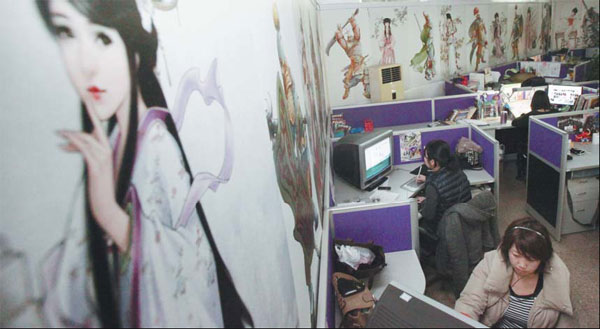Drawing room sensation
Updated: 2013-05-10 07:34
By Yang Yang (China Daily)
|
||||||||
|
Chen Weidong now has his own studio and hires artists with passion for drawing comic books. Jia Lei / For China Daily |
How a meeting over tea in tianjin turned classic comic book capers into a serious business
It was an hour that changed Chen Weidong's life - and the fate of China's comics industry.
One day late in 2005, a man from South Korea came to a three-story house in the Nankai district of Tianjin, where Chen, a struggling comicbook artist, had his office.
Opening the dirty glass door, the visitor saw an excited group of people playing mahjong, and on the other side of the stairs a small convenience shop. He squeezed his way up to the second floor, where he sat down at a table on which Chen started to make tea in the traditional intricate fashion.
Han Jung-rok, the president of Cambridge Co Ltd, a publisher of English books in Seoul, was very interested in Chinese culture. He had met Chen years previously and the two became good friends. But this time, he came to do business.
Chen, then 36, and his Tianjin Creator World Comic Company were in a crisis. The creative team led by Chen had been engaged in a huge project: adapting China's four great classical novels - A Dream of Red Mansions, Journey to the West, Romance of the Three Kingdoms and The Water Margin - into comic books.
"We wanted to do something different, something brilliant that could not be surpassed for three decades, so in this once-in-a-lifetime project we did a large amount of research and tried to apply traditional Chinese painting techniques, such as those in gongbi painting ("meticulous" realist style) to comic creation," Chen says, sitting and making tea in the tea room on the ground floor, which his company has taken over, the rooms now decked with shelves of hundreds of comic books and periodicals.
The project started in 2002 and by 2005 Chen had finished Journey to the West and The Water Margin. His team had spent 18 months making field trips, studying novels, outlining the stories and creating the characters. It took them another two years to finish the drawing.
The project was so time and money consuming that at the end of 2005 it seemed impossible to continue.
Chen planned to create 30 books for each novel, 120 in all, which would have meant a massive undertaking for any Chinese publisher at that time.
Besides, the four classic novels were so popular in China, there were already many versions in print and on other media. No parent would pay several hundred yuan to buy picture books for their children, who already knew the story and would have little further interest.
Chen, however, believed they would still be attractive to other non-Chinese speakers and to people from other cultures who wanted to know about the country's classic literature. The comic books might prove a good introduction. The vivid drawings not only told stories but also presented details of ancient Chinese clothing, hairstyle, decorum, architecture and customs.
It was exactly what Han Jung-rok believed too.
Han's visit saved the project. He negotiated with Chen for an hour and then bought the international dealership of the four collections for 10 million yuan ($1.6 million; 1.2 million euros at today's rates).
It was a big deal for any Chinese cartoonist at a time when Japanese comics dominated the Asian market. For most, it was a labor of love, earning very little income.
It also meant Chen and his team could carry on and complete Romance of the Three Kingdoms and A Dream of Red Mansions.
To date, the comic books of Journey to the West and Romance of the Three Kingdoms have been sold in 17 versions to countries and regions including South Korea, Japan, Spain, the UK, France, the US, Thailand and Vietnam.
Japan is one of the most difficult markets to enter because it has its own highly developed comic industry. Japanese comic books also account for 40 percent of the European market and 20 percent of the US, Chen says.
So it was almost a superheroic act when, in 2006, The Water Margin became the first Chinese original comic book to enter the Japanese market.
And back home the same year, the black-and-white Japanese comic style, which had dominated the Chinese market for decades, met its colorful match when Chen cooperated with China's largest periodical publisher, Zhiyin Group, to launch a comic weekly called Zhiyinmanke in his "New Chinese Comic Style".
The weekly proved very successful and now the new style dominates the domestic market.
Chen was born and grew up in a remote city in northwest China's Xinjiang Uygur autonomous region. His parents had been among those sent from the cities to the countryside during the "cultural revolution" (1966-76).
He went on to study oil painting at Hangzhou Normal University, in the beautiful city known as "the heaven on earth" in Zhejiang province, East China.
After graduating, he went to Beijing, joining a group of young painters at the Old Summer Palace, close to the Summer Palace, who lived meagerly off the sale of their art.
In 1995 Chen landed a design job at an advertising company in Tianjin. But what he always wanted to do was to create comics that could influence a person's whole life, as they had when he was a child. He left the company a year later and started his own studio, Creator World Comic.
Since that meeting with Han, his Korean publisher friend, the success of the four Chinese classic comic book series has brought Chen fame and wealth.
Chen's studio too has developed into a business group that incorporates a creative branch, copyright company and website service.
"For years, most of China's cartoonists have been starving," says Chen, now 44. "They earn very little from their drawing - 200 to 300 yuan for a page. Even if they become popular, there will be many copycats right away. That is what I'm trying to change through our group."
And, comic illustrators across the country are being inspired by his story and dreaming of emulating his success.
yangyangs@chinadaily.com.cn
|
Chen's comic book The Romance Of theThree Kingdoms earned him fame and money. |
(China Daily 05/10/2013 page15)

 Michelle lays roses at site along Berlin Wall
Michelle lays roses at site along Berlin Wall
 Historic space lecture in Tiangong-1 commences
Historic space lecture in Tiangong-1 commences
 'Sopranos' Star James Gandolfini dead at 51
'Sopranos' Star James Gandolfini dead at 51
 UN: Number of refugees hits 18-year high
UN: Number of refugees hits 18-year high
 Slide: Jet exercises from aircraft carrier
Slide: Jet exercises from aircraft carrier
 Talks establish fishery hotline
Talks establish fishery hotline
 Foreign buyers eye Chinese drones
Foreign buyers eye Chinese drones
 UN chief hails China's peacekeepers
UN chief hails China's peacekeepers
Most Viewed
Editor's Picks

|

|

|

|

|

|
Today's Top News
Shenzhou X astronaut gives lecture today
US told to reassess duties on Chinese paper
Chinese seek greater share of satellite market
Russia rejects Obama's nuke cut proposal
US immigration bill sees Senate breakthrough
Brazilian cities revoke fare hikes
Moody's warns on China's local govt debt
Air quality in major cities drops in May
US Weekly

|

|









